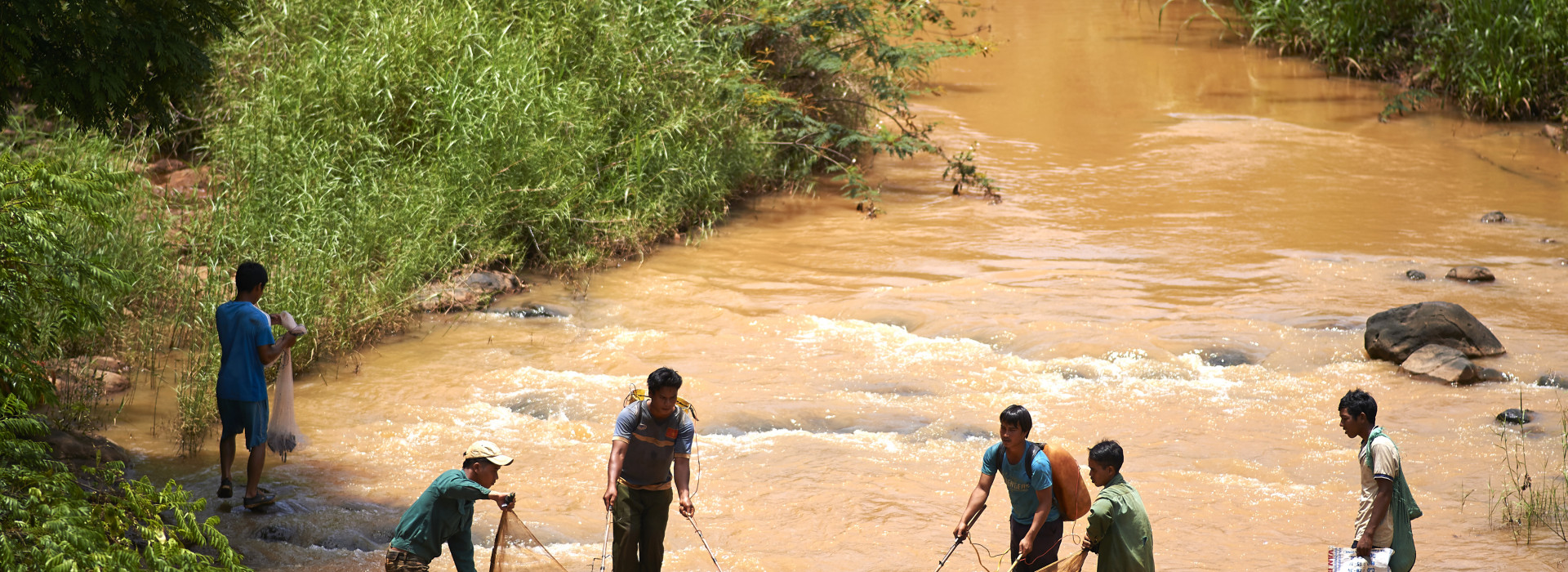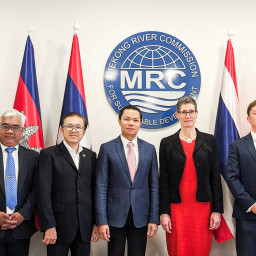Cambodia, Viet Nam make plans for implementing Council Study recommendations
Vientiane, Lao PDR, 31 October 2018 – Cambodia and Viet Nam have recently held consultations to begin the process of considering and implementing recommendations from the Mekong River Commission (MRC) Council Study into national policies and programs, while these are forthcoming in Lao PDR and Thailand. They aim to take advantage of the suite of new processes, tools, and datasets provided by the study to improve decision making on future sustainable development in the lower Mekong basin.
Improved knowledge can help manage basin-wide trade-offs
The so-called Council Study, formally titled the Study on Sustainable Management and Development of the Mekong River including Impacts of Mainstream Hydropower Projects, was commissioned in 2011 by the MRC Council—the highest, ministerial-level of the organisation, composed of water resources and environment ministers from the MRC’s four Member Countries—and completed late last year. It aims to fill previous knowledge gaps and to enable the MRC to better advise its Member Countries – Cambodia, Lao PDR, Thailand and Viet Nam – on positive and negative impacts of water resource development on the people, economies, and environment of the basin, including the impacts of mainstream hydropower projects.
One of the main conclusions of the study is that sustainable, equitable water resource development in the lower Mekong basin requires supranational policies and objective science-based approaches. Other outputs include integrated and cumulative assessments of development impacts and detailed evaluations of the positive and negative impacts of hydropower development, among other sectors.

Part of the under construction Xayaburi hydropower project in Lao PDR
At the regional level, the MRC has worked to incorporate the findings and tools established by the Council Study in its procedures and operations, such as in its upcoming 2018 state of basin report and its ongoing update of sustainable hydropower development strategy. It is also working with partners such as the US Army Corps of Engineers and the Global Water Partnerships to help further understand results of the Council Study and their application, using a shared vision planning tool – a collaborative approach to formulating water management solutions that integrates traditional planning processes with structured public participation and collaborative computer modeling.
In addition, the MRC is supporting its Member Countries to implement the Council Study findings into the national plans and projects. This is in response to the Member Countries’ expectation that the MRC will work to include Council Study findings at both policy and technical levels to capture development opportunities and address trade-offs, as expressed in the 2018 Siem Reap Declaration.
National-level uptake of Council Study recommendations
On August 13, 2018, the Cambodia National Mekong Committee hosted a national consultation meeting with six other relevant line ministries in attendance. This meeting was convened to review and discuss the proposed national key activities and tasks identified in response to the recommendations of the Council Study.
Top priorities identified during the meeting included transboundary and trans-sectoral sharing of costs and benefits from hydropower and other water resources development as well as improved negotiation between countries. These priorities follow naturally from Cambodia experiencing increasing changes to natural systems, such as changes in water flow; water flows across the basin are predicted to continue to change in the future, with increased flow during dry season times, but decreased flow during wet seasons. Another issue of concern in Cambodia, and in the basin as a whole, is declining fish catches. Under future development scenarios, the Council Study predicts, fish biomass in the Lower Mekong Basin could decrease by up to 40%.

Villagers sell fish in a local market in Stung Treng province of Cambodia
While such changes are caused by a diverse range of both anthropogenic and natural pressures, including increasing climate variability and change, land use changes, increasing market demand, unsustainable fishing practices, and infrastructure development, the MRC is supporting its Member Countries put in place the best possible measures to mitigate impacts from hydropower development. These include basin-wide strategies and initiatives such as concerted efforts to increase dialogue and cooperation on transboundary water resource planning, plans for joint environmental monitoring of the impacts of the Xayaburi and Don Sahong hydropower project, and updates to the MRC’s design guidance for proposed mainstream dams to optimize design and operation of dams.
In Viet Nam, a similar national consultation meeting took place on October 9. Hosted by the Viet Nam National Mekong Committee, the meeting was attended by five line agencies, MRC representatives, and other stakeholders.
At this meeting, discussions focused on how improved tools and data can better guide future development decisions. Vietnamese decision makers highlighted that the multi-sectoral and integrated approach used in the Council Study make its recommendations more useful than those of previous reports as they include considerations of transboundary and cumulative impacts. Viet Nam shares important river systems with Cambodia and Lao PDR, notably the Sekong, Sesan and Sepok river basins, and improved planning and management of resources within these basins are naturally dependent on a clearer understanding of transboundary impacts and trade-offs.
Both Viet Nam and Cambodia requested that the MRC continue its work to collect and share up-to-date data and develop high-quality tools and models. It was also requested that the new tools and models are complemented by a capacity building program that will enable national line agencies to make the best possible use of them. The high interest in improved data and tools is a testament to the growing commitment to using science-based approaches for development planning, as recommended by the Council Study.
Next steps – a top priority for 2019
To move forward the integration of Council Study findings and recommendations, the MRC Secretariat will work with Cambodia and Viet Nam to develop comprehensive action plans. In addition, national consultation meetings are expected to take place in Thailand and Lao PDR early next year, and the MRC will make supporting national uptake of Council Study a top priority within its 2019 work plan.
-END-





